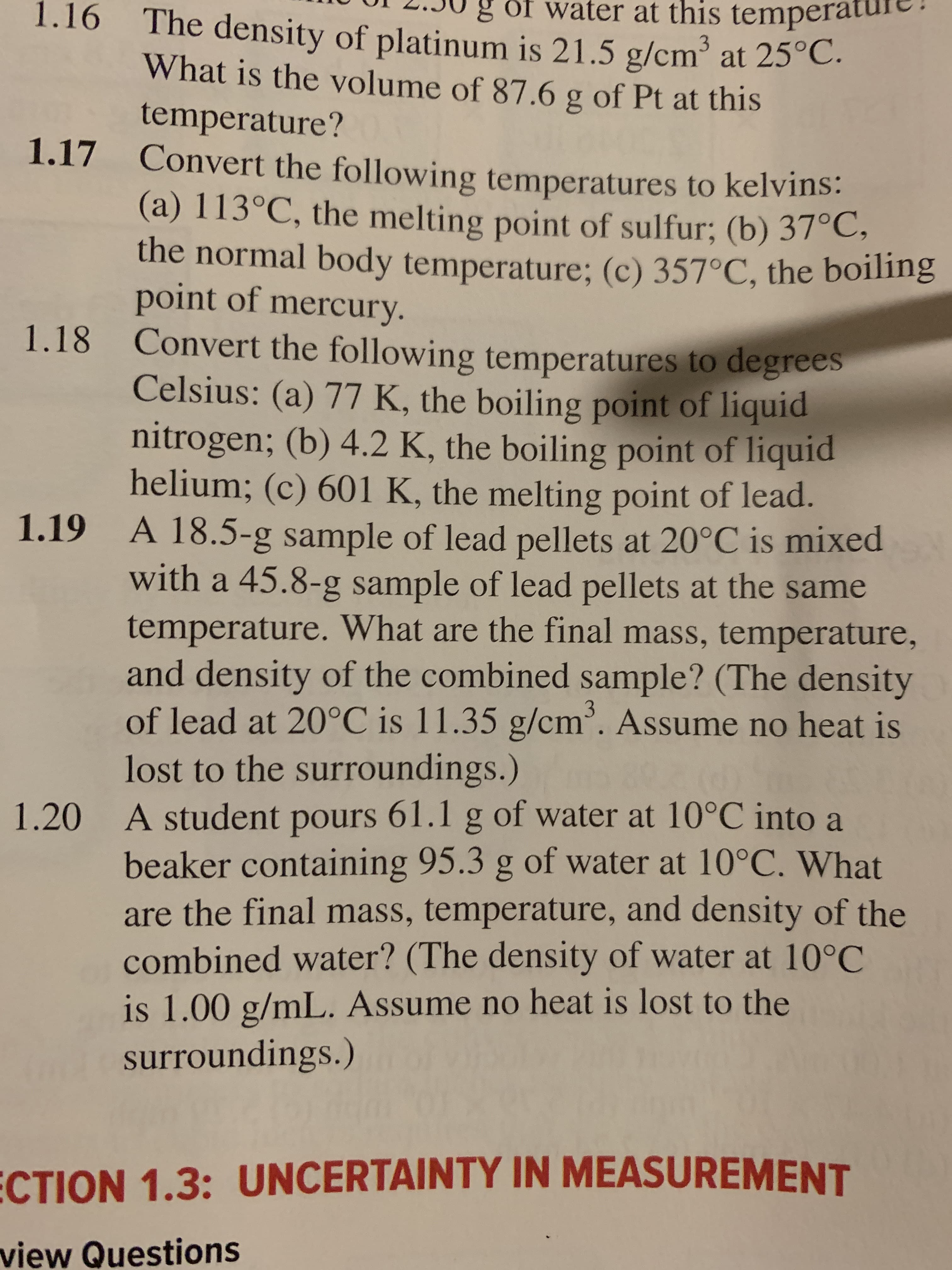of water at this tempera 1.16 The density of platinum is 21.5 g/cm' at 25°C. What is the volume of 87.6 g of Pt at this temperature? 1.17 Convert the following temperatures to kelvins: (a) 113°C, the melting point of sulfur; (b) 37°C the normal body temperature; (c) 357°C, the boiling point of mercury. 1.18 Convert the following temperatures to degrees Celsius: (a) 77 K, the boiling point of liquid nitrogen; (b) 4.2 K, the boiling point of liquid helium; (c) 601 K, the melting point of lead. 1.19 A 18.5-g sample of lead pellets at 20°C is mixed with a 45.8-g sample of lead pellets at the same temperature. What are the final mass, temperature, and density of the combined sample? (The density of lead at 20°C is 11.35 g/cm. Assume no heat is lost to the surroundings.) A student pours 61.1 g of water at 10°C into a beaker containing 95.3 g of water at 10°C. What are the final mass, temperature, and density of the combined water? (The density of water at 10°C is 1.00 g/mL. Assume no heat is lost to the surroundings.) 1.20 ECTION 1.3: UNCERTAINTY IN MEASUREMENT view Questions
of water at this tempera 1.16 The density of platinum is 21.5 g/cm' at 25°C. What is the volume of 87.6 g of Pt at this temperature? 1.17 Convert the following temperatures to kelvins: (a) 113°C, the melting point of sulfur; (b) 37°C the normal body temperature; (c) 357°C, the boiling point of mercury. 1.18 Convert the following temperatures to degrees Celsius: (a) 77 K, the boiling point of liquid nitrogen; (b) 4.2 K, the boiling point of liquid helium; (c) 601 K, the melting point of lead. 1.19 A 18.5-g sample of lead pellets at 20°C is mixed with a 45.8-g sample of lead pellets at the same temperature. What are the final mass, temperature, and density of the combined sample? (The density of lead at 20°C is 11.35 g/cm. Assume no heat is lost to the surroundings.) A student pours 61.1 g of water at 10°C into a beaker containing 95.3 g of water at 10°C. What are the final mass, temperature, and density of the combined water? (The density of water at 10°C is 1.00 g/mL. Assume no heat is lost to the surroundings.) 1.20 ECTION 1.3: UNCERTAINTY IN MEASUREMENT view Questions
Introductory Chemistry: A Foundation
9th Edition
ISBN:9781337399425
Author:Steven S. Zumdahl, Donald J. DeCoste
Publisher:Steven S. Zumdahl, Donald J. DeCoste
Chapter2: Measurements And Calculations
Section: Chapter Questions
Problem 108AP: On the planet Xgnu, the natives have 14 fingers. On the official Xgnuese temperature scale (CX), the...
Related questions
Question
How would I starts problem 1.19

Transcribed Image Text:of water at this tempera
1.16
The density of platinum is 21.5 g/cm' at 25°C.
What is the volume of 87.6 g of Pt at this
temperature?
1.17 Convert the following temperatures to kelvins:
(a) 113°C, the melting point of sulfur; (b) 37°C
the normal body temperature; (c) 357°C, the boiling
point of mercury.
1.18 Convert the following temperatures to degrees
Celsius: (a) 77 K, the boiling point of liquid
nitrogen; (b) 4.2 K, the boiling point of liquid
helium; (c) 601 K, the melting point of lead.
1.19 A 18.5-g sample of lead pellets at 20°C is mixed
with a 45.8-g sample of lead pellets at the same
temperature. What are the final mass, temperature,
and density of the combined sample? (The density
of lead at 20°C is 11.35 g/cm. Assume no heat is
lost to the surroundings.)
A student pours 61.1 g of water at 10°C into a
beaker containing 95.3 g of water at 10°C. What
are the final mass, temperature, and density of the
combined water? (The density of water at 10°C
is 1.00 g/mL. Assume no heat is lost to the
surroundings.)
1.20
ECTION 1.3: UNCERTAINTY IN MEASUREMENT
view Questions
Expert Solution
This question has been solved!
Explore an expertly crafted, step-by-step solution for a thorough understanding of key concepts.
This is a popular solution!
Trending now
This is a popular solution!
Step by step
Solved in 3 steps with 1 images

Knowledge Booster
Learn more about
Need a deep-dive on the concept behind this application? Look no further. Learn more about this topic, chemistry and related others by exploring similar questions and additional content below.Recommended textbooks for you

Introductory Chemistry: A Foundation
Chemistry
ISBN:
9781337399425
Author:
Steven S. Zumdahl, Donald J. DeCoste
Publisher:
Cengage Learning

Chemistry & Chemical Reactivity
Chemistry
ISBN:
9781337399074
Author:
John C. Kotz, Paul M. Treichel, John Townsend, David Treichel
Publisher:
Cengage Learning

Chemistry: The Molecular Science
Chemistry
ISBN:
9781285199047
Author:
John W. Moore, Conrad L. Stanitski
Publisher:
Cengage Learning

Introductory Chemistry: A Foundation
Chemistry
ISBN:
9781337399425
Author:
Steven S. Zumdahl, Donald J. DeCoste
Publisher:
Cengage Learning

Chemistry & Chemical Reactivity
Chemistry
ISBN:
9781337399074
Author:
John C. Kotz, Paul M. Treichel, John Townsend, David Treichel
Publisher:
Cengage Learning

Chemistry: The Molecular Science
Chemistry
ISBN:
9781285199047
Author:
John W. Moore, Conrad L. Stanitski
Publisher:
Cengage Learning